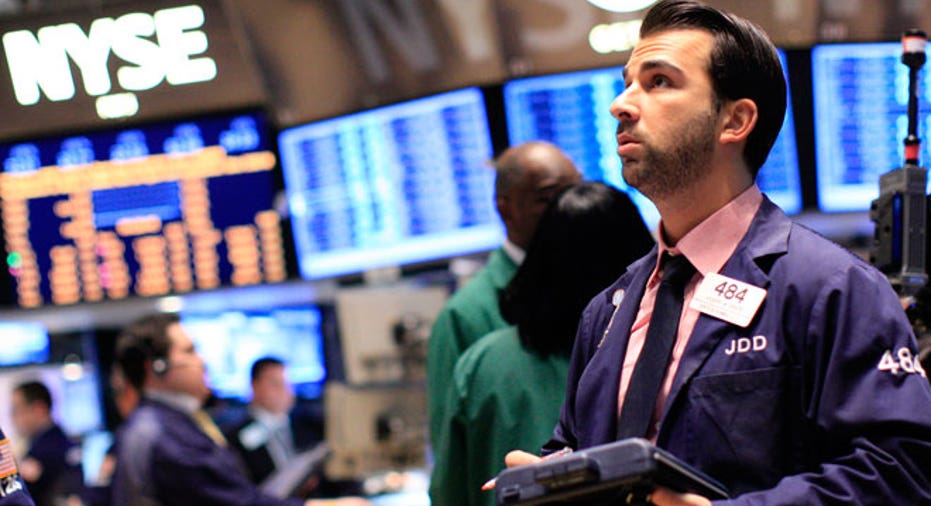Losing Streak: Data, EU Woes Slam Wall Street

FOX Business: The Power to Prosper
Wall Street sold off for the third session in a row as grim manufacturing data and rekindled debt drama in the eurozone spooked traders.
Today's Markets
The Dow Jones Industrial Average fell 104 points, or 0.82%, to 12617 the S&P 500 dipped 12.2 points, or 0.9%, to 1338 and the Nasdaq Composite slid 27.2 points, or 0.94%, to 2863.
In a sign of the growing fear across global equity markets, the yield on the benchmark 10-year U.S. Treasury bond has repeatedly fallen to fresh record lows. The yield on the safe-haven asset closed the day out at 1.404%, just slightly above the days lows.
Every major sector was to the downside, led by telecommunications, materials, energy, industrial and health-care stocks. While the market did take heavy losses on the day, the Dow managed to trim a nearly 200-point drop.
The pace of expansion in the U.S. manufacturing sector slowed down in July from the month before, according to Markit. The company's Flash Manufacturing PMI gauge fell to 51.8 from 52.5 the month before, slightly weaker than the 52 expected. It was the worst reading since December 2010.
A separate report from the Richmond Federal Reserve showed the manufacturing sector in that region contracting at a much faster pace in July than the month before.
Data from the eurozone pointed to continued weakness as well. The Markit flash PMI gauge held steady at 46.4 in July from the month before, marking the sixth month in a row that the eurozone private sector contracted. Of particular concern, economists said, were data showing the manufacturing sector shrinking at the fastest pace since May 2009. Germany, Europe's biggest economy, also saw its output fall for the third month in a row.
"The flash PMI for July suggests the euro area downturn showed no signs of letting up at the start of the third quarter," Chris Williamson, Markit's chief economist wrote in the report. "The downturn is being led by an increasingly severe slump in manufacturing."
In China, there were some signs of improvement. A survey by HSBC showed manufacturing in the world's No. 2 economy contracting at the slowest pace in five months, pointing to stabilization. Hongbin Qu, the bank's chief economist for China, wrote in the report that the data indicate "earlier easing measures are starting to work."
The Chinese central bank has recently slashed lending and deposit rates in an effort to keep the economy from cooling off too quickly.
The pace of headlines from the embattled eurozone has increased markedly this week. Moody's, after the close of trading in New York on Monday, said it has changed its outlook on Germany, the Netherlands and Luxembourg to negative from stable. The credit ratings company cited a heightened risk of a Greek exit from the euro and the chance that these three Aaa-rated countries will likely need to provide some backstop for the broader currency bloc. Moody's also affirmed Finland's Aaa and stable outlook.
On top of that, Reuters reported that Greece is unlikely to meet its fiscal goals, meaning more debt restructuring may be necessary.
"The air coming out of the eurozone is having a big impact on top and bottom-line growth" across big U.S. companies, Teddy Weisberg a long-time NYSE floor trader with Seaport Securities said in an interview with FOX Business.
Indeed, United Parcel Service (NYSE:UPS) posted a second-quarter EPS of $1.15 on sales of $13.4 billion. The Street was looking for profits of $1.17 a share on $13.7 billion. The shipping company also sliced its full-year earnings outlook to between $4.50 and $4.70 a share, weaker than the average estimate of $4.83.
AT&T (NYSE:T) revealed second-quarter profits of 66 cents a share, beating analyst estimates by three cents. The Dow component’s revenues came in at $31.6 billion, slightly below the $31.7 billion Wall Street expected.
Apple (NASDAQ:AAPL), the biggest U.S. company by market capitalization, is set to report its quarterly results after the closing bell on Tuesday.
Commodities markets were mixed. The benchmark crude oil contract traded in New York rose 36 cents, or 0.41%, to $88.50 a barrel. Wholesale New York Harbor gasoline slid 2% to $2.825 a gallon.
In metals, gold slipped $1.20, or 0.08%, to $1,576 a troy ounce.
Foreign Markets
The Euro Stoxx 50 fell 0.98% to 2158, the English FTSE 100 dipped 0.41% to 5511 and the German DAX slumped 0.24% to 6404.
In Asia, the Japanese Nikkei 225 slipped 0.24% to 8488 and the Chinese Hang Seng slid 0.79% to 18903.



















